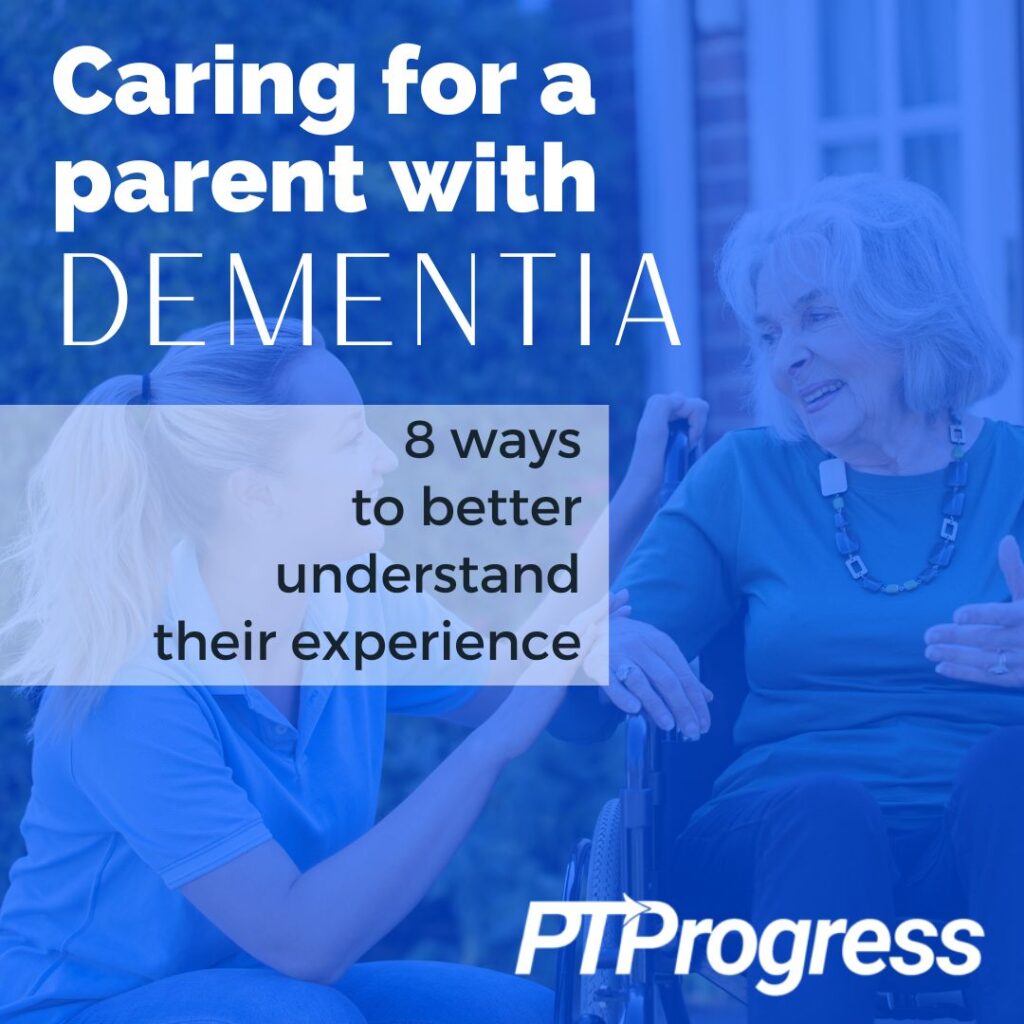
Dementia affects over 55 million people worldwide, resulting from many causes and diseases of the brain. In fact, the term “dementia” refers to a cluster of diseases that affect memory and the ability to perform activities of daily living. The most common type of dementia is Alzheimer’s disease, making up 60–70% of cases. Factors that place one at a higher risk for dementia include advanced age (65+), excessive alcohol use, social isolation, smoking, high blood pressure, diabetes, sedentary lifestyle, and depression.
Chances are, if one of your parents lives long enough, they will develop some type of dementia. If you are caring for a parent with dementia, the most helpful thing you can do is to try to understand how your mom or dad now sees the world. They do not have the same perceptions that they had when you knew them as younger people. The damage to their brain has likely changed their views, opinions, actions, reactions, and ways of communicating.
The 8 “A’s” of Dementia
Understanding the “8 A’s” of dementia can help you better care for your loved one.
1. Anosognosia

Anosognosia is what makes people with dementia seem like they are in denial or stubborn, but really it is damage to their brain that makes them unable to understand what is happening to them. They may resist help or overestimate their abilities.
Let’s say your dad has had his driver’s license revoked due to dementia, but he insists on driving to the store. Arguing and reminding him he no longer has a license or a car may agitate or sadden him. Instead, redirect and tell him you’d like to drive him to the store so you can go together—and you have your car right out front with a full tank of gas.
2. Amnesia
Amnesia is a memory loss that initially impacts short-term memories and, as the disease progresses, may affect long-term memory. Amnesia is the part of dementia that will cause someone to repeat themselves, become overwhelmed or be unable to perceive time.
When a loved one has amnesia, speak slowly and keep a routine for them. That way, they will have increased time to process what you are saying, the routine will be comfortable for them, and they may even begin to remember it. The more predictable the day, the easier and less agitation you both will experience.
3. Aphasia
Aphasia is an impaired ability to communicate—to speak or understand language. This can be especially frustrating when your parents make up words, use the wrong words, or even get upset with you because they don’t understand what you are saying!
Again, speak slowly, use as much nonverbal communication as possible, and maintain calm body language. People with aphasia read your body language. If they determine you are feeling angry or impatient, they too will become distressed.
4. Agnosia

Agnosia, or the inability to recognize objects or people, causes fear and distress in our loved ones with dementia. They may try to use the TV remote as a telephone or brush their teeth with a pen. This is also what makes family and friends appear to be strangers—even if they’ve known each other for over 20 years.
Compensatory strategies around this impairment include labeling common items, demonstrating how to use an item before having your parent attempt the task, and frequently introducing yourself, other loved ones, and caregivers. Also, keep dangerous items locked up; remember, someone with dementia may forget that a knife can cut them.
5. Apraxia
Forgetting how to get dressed—and losing the physical coordination to do so—is called Apraxia. It can make people seem uncooperative: “I don’t want to get dressed!” But really, what they are saying is, “I don’t remember how.” Mom or Dad may become defensive or even defiant in order to avoid admitting that they don’t understand what you are asking of them.
A good strategy for this is to set them up for success. In the morning, lay out clothing in order of how it’s donned, display sequential pictures, keep distractions to a minimum and replace difficult tasks, such as tying shoes, with easier tasks such as securing Velcro straps. Most importantly, if Mom or Dad is getting too frustrated, walk away. There’s always time later in the day. And if you’re in a time crunch, say, to get to a doctor’s appointment, redirect your parent and assist them.
6. Altered Perception
The next “A”—Altered Perception—summarizes the majority of the behaviors in this article. Altered Perception makes someone living with dementia see their entire environment differently. They begin to have depth perception issues, visual changes and difficulty moving through space. The stairs may look higher or lower than normal, water in the tub may look very deep or seem hotter or colder than it really is, and a darker room could appear ominous to someone with dementia.
At this point, increased lighting and regular eye tests are key so that at least vision is not a concern. Doing things like demonstrating the depth of water, the temperature of the food or just reassuring them that they are safe will make day-to-day tasks easier and more pleasurable for your parent with dementia.
7. Apathy

Apathy can be one of the most frustrating characteristics when dealing with dementia. Mom or Dad may act like they don’t care about anything at all. Remember, this is a problem with the motivational pathways in their brain, not a personality trait or their true feelings. They may show little emotional response to events, whether good or bad; they may not be able to complete a task or watch an entire show; they may appear to have very low energy; and they may actually be smug and tell you they don’t care. Often people with dementia will have a flat affect as well, making few facial expressions.
If asking them if they would like to participate in an activity elicits a frustrating response, try telling them what you are going to do. Instead of, “Hey, Dad, would you like to go to the store?” try “Hey, Dad, here are your shoes and coat; we are going to the store.” As they lose the ability to take initiative they will still be able to follow simple commands and will be more likely to do so.
Perform tasks or activities that they used to like and encourage them to participate by giving them tasks. “Here, Mom, I’m making a cake. Will you please sift the flour?” Lastly, be consistent. Tasks that are “routine” are much easier than new tasks.
8. Attentional Deficits
Finally, the last “A” to be aware of is Attentional Deficits. When someone develops dementia, they also lose their attention span. They may get easily distracted during a conversation and completely lose interest or forget what you were talking about in the first place.
To combat this, have only one person speak at a time, reduce distractions, be in a quiet space, and only visit with one person or a small group. If presenting a gift or an item, only show one item at a time, one picture on a page, or one concept at a time.
Caring for a Parent with Dementia: Summary
It may be frustrating and burdensome to take care of a parent with dementia. Don’t be afraid to ask for help or look to local nursing homes and other facilities for daycare or respite care. Everyone, even medical caregivers, deserves and needs a break from caregiving. Don’t feel alone.
Also, be sure to check out such invaluable resources as the Alzheimer’s Association, Alzheimer’s Foundation of America, Lewy Body Dementia Association and the National Task Group on Intellectual Disabilities and Dementia Practices. There are also online and in-person support services and groups for those caring for loved ones with dementia. For example, the Alzheimer’s Association has groups in each state, as do hospitals and other organizations. Make sure to look for support for yourself; caring for a loved one can feel thankless and taxing. You can’t do a good job caring for a loved one if you don’t care for yourself too.
About the Author: Rebecca Stephens, DPT
Becky has been practicing physical therapy since 2005. A graduate of Drexel University, she has presented at Combined Sections and practiced in several different settings over the years. When she is not working she loves to hang out with her dog, Cash, and mountain bike with her husband and 2 kids. Currently, she works in an inpatient residential facility in New England.

